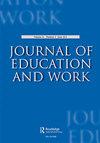Reconceptualising the transition from post-secondary education to work
IF 1.7
Q2 EDUCATION & EDUCATIONAL RESEARCH
引用次数: 2
Abstract
ABSTRACT Educational researchers identify the transition from post-secondary education to the labour market as a critical point for the success of the student, and for society more broadly. This transition is often explored as a distinct phase between education and work that can be assessed based on pre-determined outcomes (i.e. employment, income). From this perspective, it is the responsibility of individual students to effectively commodify themselves and navigate their transition into employment. This focus on individual responsibility fails to question social mobility discourse and current labour market realities that significantly influence transition. In order to re-conceptualise transition, I deconstruct social mobility discourse as the foundation of transition research. Then, I draw on narratives of social service workers in British Columbia, Canada, to complexify transition and allow for more nuanced research. The narratives contradict dominant conceptualisations of transition, critiquing transition as a linear process that can be assessed through economic indicators. Recognising transition as a continual process that is influenced by a multiplicity of factors opens new ways to research. Research exploring the nuance of transition moves away from a deficit-focused, intervention approach focused on students, to critically exploring education, the labour market, and the relationship between school and work.重新认识从中学后教育到工作的转变
教育研究人员认为,从中学后教育到劳动力市场的转变是学生和更广泛的社会成功的关键点。这种过渡通常被视为教育和工作之间的一个不同阶段,可以根据预先确定的结果(即就业、收入)进行评估。从这个角度来看,每个学生都有责任有效地将自己商品化,并引导他们向就业的过渡。这种对个人责任的关注没有质疑社会流动性话语和当前劳动力市场的现实,而这些话语对转型有着重大影响。为了重新定义转型,我解构了作为转型研究基础的社会流动性话语。然后,我借鉴了加拿大不列颠哥伦比亚省社会服务工作者的叙述,使过渡变得复杂,并允许进行更细致的研究。这些叙述与主流的转型概念相矛盾,批评转型是一个可以通过经济指标来评估的线性过程。认识到过渡是一个受多种因素影响的持续过程,为研究开辟了新的途径。探索过渡的细微差别的研究从以赤字为中心,以学生为中心的干预方法转向批判性地探索教育,劳动力市场以及学校与工作之间的关系。
本文章由计算机程序翻译,如有差异,请以英文原文为准。
求助全文
约1分钟内获得全文
求助全文
来源期刊

Journal of Education and Work
EDUCATION & EDUCATIONAL RESEARCH-
CiteScore
2.70
自引率
14.30%
发文量
40
期刊介绍:
The Journal of Education and Work is an international forum for academic research and policy analysis which focuses on the interplay of the education and economic systems. The journal examines how knowledge, skills, values and attitudes both about and for work and employment are developed within the education system. The journal also explores the various forms of industrial training and accreditation in the economic system, including changes in the economic and industrial infrastructure which influence the type of employees required. Work in the informal economy is also included.
 求助内容:
求助内容: 应助结果提醒方式:
应助结果提醒方式:


